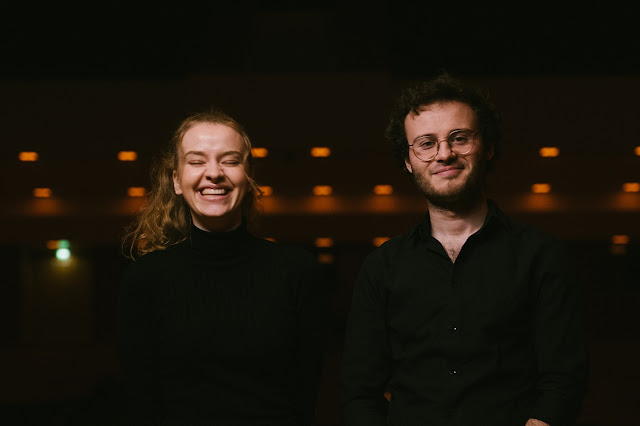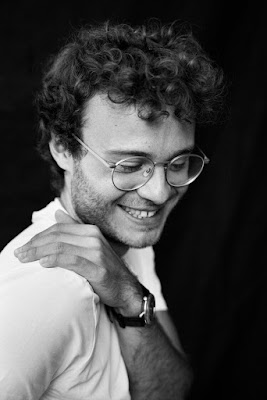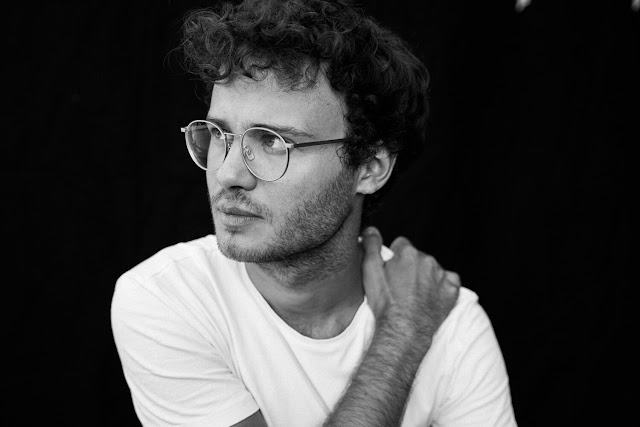Whilst not all the music on New Standards is well known and probably the names of two of the composers will be unfamiliar to many listeners, Simon explains that for a trumpeter these works are the core essentials of chamber music. Honegger, Enescu, Hindemith and Francaix are all established 20th-century figures, but the names of Karl Pilss and Alexander Arutjunjan are less well known. Arutjunjan was a Soviet Armenian composer who wrote both the Aria et Scherzo, which is on the disc, and a Trumpet Concerto [which is on the previous disc and is also on YouTube]. These were written for a major Russian trumpeter and the concerto is very much a virtuoso showpiece. Simon describes Arutjunjan's music as fantastic, and the Aria et Scherzo is in a style similar to, but not as strident as Hindemith's Sonata which is also on the disc. In fact, Simon describes Arutjunjan's Aria et Scherzo as refreshing, and adding that it is fun to play.
 |
| Elisabeth Brauß and Simon Höfele (Photo credit Michael Winkler) |
The other lesser-known name is that of Karl Pilss (1902-1979), an Austrian composer who studied with Franz Schmidt (1874-1939). Pilss is a recent discovery for Simon.
Besides the Sonata which he plays on the disc, there is also a concerto, though Simon has never played it. He is enthusiastic about Pilss' Trumpet Sonata and describes it as being reminiscent of Richard Strauss, which is particularly grateful as of course Strauss never wrote a trumpet sonata. Whilst the Hindemith and Enescu works on the disc are the most often played, Simon feels that Pilss' sonata ought to be too. It should be essential repertoire, hence his title for the disc New Standards.Whilst there are no big romantic 19th century concertos for the trumpet, Simon feels that there is a lot of repertoire but trumpeters tend to focus on particular areas. For instance, there is a significant amount of music written in the late 19th and early 20th centuries for the cornet à pistons by French and Belgian composers who are all completely unknown. Simon is rather fond of this repertoire and used to play a programme entirely made up of music by French and Belgian composers written for the cornet à pistons. There is also a Russian school of trumpet playing and composition which is rather more bravura in nature.
Whilst the trumpet does not feature that much in the well-known chamber music repertoire, for Simon it is the most natural thing in the world to perform with piano, and he sees this new disc as a complement to the previous concerto disc, so much so that not just the names are complementary, so is the artwork for the two discs. The pianist on the recording is Elisabeth Brauß, who is both a friend and an amazing pianist (and another former BBC New Generation Artist), he feels lucky both to have been able to do the two discs for Berlin Classics and to have Elisabeth as his accompanist, particularly as he found her so easy to play with.
(Since our chat it has also been announced that Elisabeth Brauß is the recipient of the 2021 Terence Judd–Hallé Award, presented by the Hallé to commemorate the work and life of Terence Judd, a remarkable talent who passed away in 1979 at the age of 22. The award includes a concerto performance with Hallé, a chamber recital with Hallé musicians, as part of the new Chamber Series at Hallé St Peter’s, a solo recital as part of the Manchester Mid-Day Concerts Series at The Bridgewater Hall and a cash prize.)
 |
| Simon Höfele recording his disc Standards with conductor Duncan Ward |
That the present disc concentrates on 20th-century music and the previous one on a mix of 18th century and 20th-century music is partly to do with the history of the trumpet as an instrument. It has taken until the 20th century for the instrument to be finished, and throughout the 18th and 19th century the trumpet was constantly being developed and improved. Both Hummel and Haydn wrote concertos for the keyed trumpet, a far from perfect instrument but one of the earliest attempts to improve the natural trumpet. These improvements were aimed at making the instrument able to play more notes, though the Haydn and Hummel concertos are the only major works for the keyed trumpet.
In the mid-19th century, the valve started to be introduced, and the trumpet begins to come together as an instrument. Not only do 20th-century composers take advantage of it, but jazz also appears and the early 20th-century jazz trumpeters really made the instrument popular. Simon sees this as a major reason why the trumpet was so in demand at this period, even if the classical composers were not writing jazz-influenced works.
Simon hopes that the programme of the recital will demonstrate to listeners that there is so much more trumpet music to discover. He feels that there is a certain stigma about trumpet repertoire. He wants to demonstrate that there is so much lovely music and that the instrument is so much more versatile than people realise. For him, the music on the disc is simply amazing and it deserves a lot more fame.
 |
| Simon Höfele (Photo Joy Dana) |
Whilst the music on the disc can be challenging to perform, Simon points out that the 20th century is a very challenging period. And the music written today is far more complicated than these 20th-century works. For example, the Hindemith Sonata is really exhausting to play but is not impossible, but in a live recital, a complete programme such as the one on the disc would not be possible because it would be so tiring. But there is also the element that we have become used to Hindemith's style. The week after we spoke, Simon was due to give the premiere of Mark Simpson's Concertino for Trumpet. This he describes as 'crazy' but adds that we have not yet got used to Simpson's style in the way we have that of Hindemith. [The video of the premiere with Alpesh Chauhan and the Duisburg Philharmonic is on YouTube]
Simon likes being challenged by complicated music, what he calls 'crazy stuff', and he cites composers such as Matthias Pintscher and György Ligeti (1923-2006) whose music he has performed and recorded. He plays a remarkable range of contemporary and 20th-century music including not just music by Peter Maxwell Davies (1934-2016) but also the Scottish composer Iain Hamilton (1922-2000), whose music Simon describes as tough, both to perform and to listen to. He enjoys finding new pieces but admits that sometimes he comes across a work that is of interest yet it does not work for him. But he is now careful with his live programmes, and he likes to mix in different contemporary works with more traditional pieces so that the programmes are not too much for the audiences.
 |
| Simon Höfele (Photo Joy Dana) |
Unlike several discs released this year, Simon's New Standards is not the product of lockdown but was already planned. But of course, when lockdown started last year nothing could happen, and even when they were able to record it, things were weird so that they were unable to go back into the sound engineers' room. But it worked, and making the recording was fun and he is grateful that the recording was not cancelled so that he actually had work to do!
When we spoke he had another recording planned, this time something entirely different; Gershwin, Miles Davies, Dizzy Gillespie, Elvis Costello, jazz trumpeter Roy Hargrove (1969-2018), Bernstein's Rondo for Lifey (written for Judy Holliday's Skye Terrier) and the trumpet sonata by Swiss jazz musician and composer Daniel Schnyder with piano, string quartet and jazz trio. The disc will explore the cross over between classical and jazz, though Simon is quick to point out that he is not a jazz man, and that the recordings will simply be a bow to some of the jazz greats, and that he hopes to make a version without saying 'we are the best jazz players'. He feels that he is a better classical musician than jazz performers, and hopes that listeners will feel that they treat the jazz pieces on the disc with respect.
This latest recording project is part of Simon's continual love of exploration. He tells me enthusiastically about a new piece for trumpet and live electronics which he played recently by the German-Turkish composer Kaan Bulak (born 1991). Bulak comes from a DJ background and his music brings in a World Music influence. Simon played it with a laptop open in front of him and with a loop pedal, and the result was astonishingly beautiful music. Simon enjoys new things and discovery brings new energy, whether it is music by Hummel and Haydn, new work or jazz. He takes the view that if something works it can open up new ideas. But he is also realistic, commenting that in ten years he might look back and think a project was not the best idea, but so what. Simon feels that in Germany people rather like labels on things, but with music it is difficult to do that.
When I ask if he always wanted to be a musician, Simon responds that first of all he wanted to be a musician, the trumpet was the right tool as the instrument fits him as a person. He started playing the trumpet at the age of seven, it was the first instrument that he had truly wanted to play. When Simon was around five his father bought a trumpet for decoration, and the young Simon played with it and announced he wanted to play the trumpet. Then his baby teeth began to fall out, and his parents decided to wait until his teeth had re-grown; it was also a good test, to see if the little boy really did want to play the instrument. Both his parents are musicians, his father a bassoonist and his mother a flautist, playing in the Darmstadt Theatre Orchestra. So Simon's first lessons were with a colleague of his parents in the orchestra. And he continued from there, and never having any doubts and he is happy to be still playing the instrument.
 |
| Simon Höfele (Photo credit Marco Borggreve) |
There was a lot of music at home when he was growing up. His father's brothers play woodwind instruments in other German orchestras so that there was woodwind chamber music at home. When I ask about his heroes, his first response is to mention his parents, who are amazing. They gave the young Simon every possibility, but there was no pressure, they simply tried to motivate him. His other big hero is his teacher Reinhard Friedrich with whom Simon worked from the age of 12 until two years ago; Simon comments that Friedrich taught him a lot.
When we spoke, Simon had quite a few performances planned, 'don't ask me why' he comments, including the broadcast of the Mark Simpson concertino, and there are other recordings in the works too.
New Standards
Arthur Honegger (1892-1955) - Intrada pour trompette en Ut et piano
Karl Pilss (1902-1979) - Sonate fur Trompete und Klavier
Georges Enescu (1881-1955) - Legende
Paul Hindemith (1895-1963) - Sonate fur Trompete in B und Klavier
Jean Francaix (1912-1997) - Sonatine pour trompette
Alexander Arutjunjan (1920-2012) - Aria et Scherzo pour trompette et piano
Simon Höfele (trumpet)
Elisabeth Brauß (piano)
BERLIN CLASSICS 0301314BC
- Standards: Hummel, Haydn, Copland, Arutjunjan - Simon Höfele, BBC Scottish Symphony Orchestra, BBC National Orchestra of Wales, Duncan Ward - BERLIN CLASSICS
- Mysteries: Ligeti, Jolivet, Toshio Howokawa, Iain Hamilton, Takemitsu, HK Gruber - Simon Höfele, Eriko Takezawa (piano), Kai Strobel (percussion) - GENUIN CLASSICS
- Concertino: Hartmann, Pintscher, Neuwith, Hindemith, Denner - Simon Höfele
Never miss out on future posts by following us
The blog is free, but I'd be delighted if you were to show your appreciation by buying me a coffee.
- Scottish piano music: Christopher Guild continues his explorations with disc devoted to Francis George Scott and to Ronald Stevenson's transcriptions - record review
- Berlin im Licht: A Kurt Weill songbook from Ricardo Panela and Nuno Vieira de Almeida - record review
- Tosca in an iconic location: Seattle Opera film's Puccini's opera at St James Cathedral, Seattle - opera review
- The Constant Heart: the Marian Consort at the Dunster Festival - concert review
- Grange Park Opera gives us a rare chance to see Rimsky Korskov's first opera, Ivan the Terrible in a striking production by David Pountney - opera review
- Still encouraging us to listen in new ways: O/Modernt Festival celebrates its 10th anniversary with a festival live and on-line - concert review
- Directing the Don and discovering Dido: I chat to director Jack Furness in advance of his production of Mozart's Don Giovanni at Nevill Holt Opera - interview
- Invisible cities: Sansara and Tom Herring explore the striking contemporary polyphony of Marco Galvani for their second album for Resonus - record review
- Taliesin's Songbook: 20th and 21st century Welsh art song explored by a fine group of Welsh singers - record review
- Purcell's music never ceases to amaze in its imagination: Royal Welcome Songs for King Charles II, volume IV from The Sixteen - record review
- Sheer enjoyment: Rachel Podger and Royal Northern Sinfonia's Bach to Bach at Sage Gateshead - concert review
- Exuberance and poise: Mozart's Le nozze di Figaro from Opera Holland Park's Young Artist - opera review
- 17th century revival: HGO makes modern drama of Cavalli's early masterpiece, L'Egisto - opera review
- Home



.jpg)









No comments:
Post a Comment